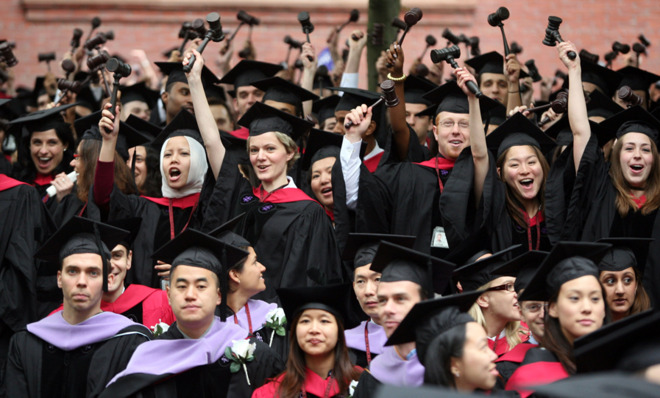The case for killing law school
Or at least making it shorter

A free daily email with the biggest news stories of the day – and the best features from TheWeek.com
You are now subscribed
Your newsletter sign-up was successful
Law professors Erwin Chemerinsky and Carrie Menkel-Meadow recently took to the pages of The New York Times to argue against proposed reductions of legal education requirements. They claim that making it easier to become a lawyer "is a terrible idea" that would result in lawyers being poorly trained, not to mention less well-rounded citizens.
Having just wrapped up three years of law school, I can say with some certainty that this is bunk. In reality, reducing barriers to entering the legal profession would probably have very little effect on quality, while also blowing up one of the biggest upper class rackets in our society.
In 2012, the median income for lawyers in this country was around $113,000, more than triple the national median income for all occupations. Why such high pay? In significant part, it's because we have made becoming a lawyer exceedingly difficult, which has the effect of driving up the prices lawyers can charge for their services.
The Week
Escape your echo chamber. Get the facts behind the news, plus analysis from multiple perspectives.

Sign up for The Week's Free Newsletters
From our morning news briefing to a weekly Good News Newsletter, get the best of The Week delivered directly to your inbox.
From our morning news briefing to a weekly Good News Newsletter, get the best of The Week delivered directly to your inbox.
To gain entry into the legal profession, you must acquire a four-year undergraduate degree, a three-year law degree, and then pass a state bar exam. These onerous credentialing requirements ostensibly act as a gatekeeper, filtering out lower-quality would-be attorneys until we are left with only a small pool of supposedly highly competent lawyers from which to hire. But by keeping this pool small in this way, lawyers are able to capture credential rents — surplus income far above what they might otherwise make. This is good for lawyers, but bad for everyone else.
The surplus income that comes from these credential rents doesn't just flow to practicing attorneys. Because getting into the profession can be so lucrative, those perched along the path that leads to it are also able to get in on the racket. For instance, Erwin Chemerinsky pulls down a $350,000 salary in his role at the University of California, Irvine School of Law. On top of that monster salary, he sells popular textbooks for law classes, publishes supplementary cheater books for law students, and then gets one last swipe at the credentialing money by availing himself as a lecturer for the most expensive bar exam preparation service.
The legal profession and everything that touches it is flush with silly amounts of cash. This is a direct result of America's legal licensing regime. And this surplus of cash creates an upper class of legal industry professionals making way more money than they ought to.
The big scandal in all of this is not that law students are somehow getting a raw deal because of the debt they undertake in their arduous path through the credential gate. It's that the whole system wastes a ton of money that could be spent on more useful things than lining the pockets of lawyers and law professors.
A free daily email with the biggest news stories of the day – and the best features from TheWeek.com
By making it easier to become a lawyer, we could undermine this malicious dynamic. Make law schools two years instead of three. Or better yet: Get rid of law schools altogether and make law an undergraduate degree. Eliminate the bar exam or, if you'd like, make passage of it the only requirement to practice law and get rid of all the rest of the qualifications. One way or another, we should do what it takes to flood the market with legal credentials and drag lawyers down into the pits or financial normality with the rest of the middle class.
This sounds extreme, but it's actually what almost every other profession is like. And they seem to work just fine. Why must lawyers be special? Do they really need more training than professionals in countless other professions? Having just gone through this training myself, I am skeptical, to say the least.
One might argue that drastically reducing licensing and education requirements for lawyers would inevitably lead to drastic quality reductions. But don't be so sure. Companies, law firms, and agencies that hire lawyers should be able to screen for quality themselves. There will still be plenty of very good lawyers.
And really, quality reductions are perfectly fine provided they come with huge savings. Saving money by going with a lower quality product is a tradeoff we make all the time in our economy. Lawyers should be exposed to the possibility of those kinds of tradeoffs just as much as anyone else is.
In America today, we make a big deal about lawyers and what we do. (Just think about all the legal-centric shows on TV...) But the reality is that most of lawyers' work is pretty mundane. Some of it can be done by computer software. Standing against efforts to "skimp on legal training" is nothing more than standing for efforts to inflate legal salaries through credential rents. Those without a direct stake in such rent-seeking should support efforts to dismantle barriers to entering the legal profession, and delight in all of the savings that such a thing would deliver.